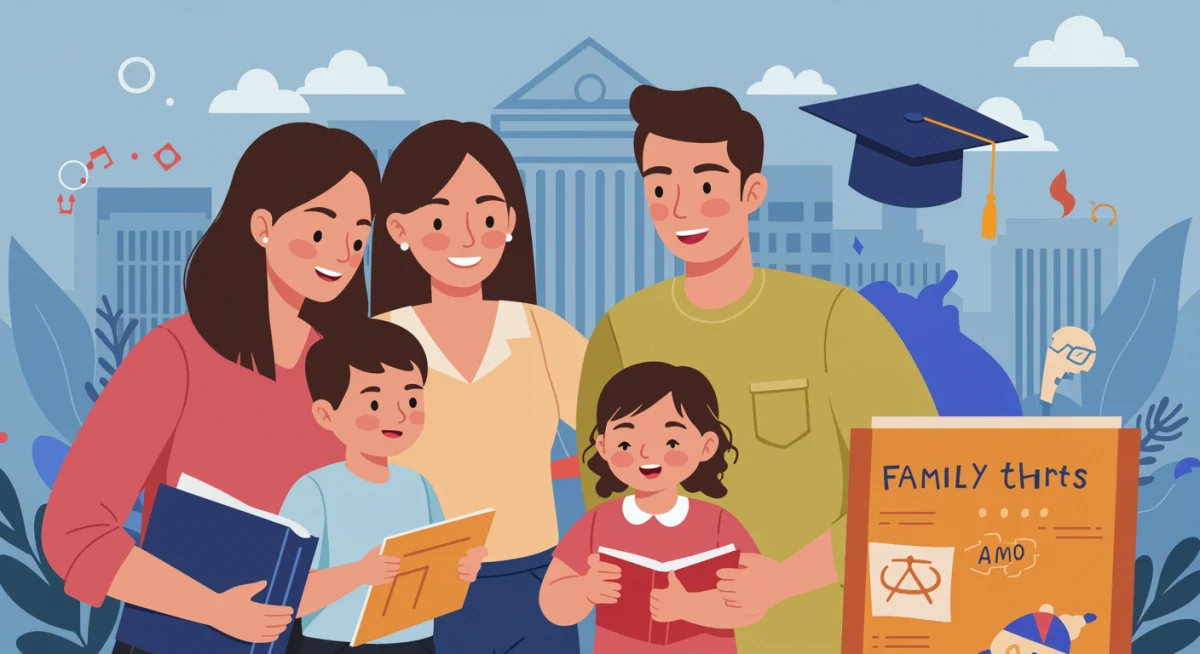Early Childhood Education Policy 2025: Key Federal Initiatives

Five pivotal federal initiatives are poised to redefine the landscape of early childhood education policy in 2025, directly influencing access, quality, and support for US families.
As we approach 2025, the conversation around early childhood education policy in the United States is more critical than ever. Federal initiatives are emerging as central pillars in shaping the future of how young children learn, grow, and thrive, directly impacting millions of US families. Understanding these policies is crucial for parents, educators, and policymakers alike.
The Foundation of Federal Involvement in Early Learning
Federal involvement in early childhood education has historically been a complex tapestry, woven through various programs and legislative acts. From Head Start to the Child Care Development Block Grant, the government has recognized the profound impact of early learning on a child’s long-term success and societal well-being. These programs aim to provide a crucial foundation, especially for underserved communities, ensuring that all children have access to high-quality educational experiences before formal schooling begins.
The philosophical underpinnings of federal engagement often revolve around equity, access, and quality. Policymakers frequently debate the optimal balance between state and federal control, funding mechanisms, and the specific age groups to target. The evolving understanding of brain development in early years continues to fuel the impetus for more comprehensive and sustained federal support.
Historical Context and Evolution
The journey of federal early childhood education policy has seen significant shifts, reflecting changing societal needs and scientific advancements in child development. Early efforts were often fragmented, focusing on specific demographics or immediate needs. However, the recognition of early learning as a critical investment has led to a more integrated and strategic approach.
- Head Start’s Legacy: Established in 1965, Head Start has been a cornerstone, providing comprehensive services to low-income children and families.
- Child Care Development Fund: This fund offers subsidies and quality improvement initiatives, supporting working families and enhancing child care standards.
- Preschool Development Grants: These grants have encouraged states to expand and improve their preschool programs, fostering collaborative efforts.
The evolution underscores a growing consensus that robust early childhood education infrastructure is not merely a social service but an economic imperative, yielding significant returns on investment through improved educational outcomes, reduced crime rates, and enhanced workforce productivity. This historical perspective sets the stage for understanding the new initiatives planned for 2025.
Initiative 1: Expanding Access to Affordable Child Care
One of the most pressing concerns for US families is the prohibitive cost of child care. Many families face a significant financial burden, often exceeding housing or college tuition expenses. The first key federal initiative for 2025 aims to directly address this by significantly expanding access to affordable, high-quality child care options across the nation. This initiative recognizes that accessible child care is not just a family issue, but a critical component of economic stability and workforce participation.
The proposed legislation seeks to increase federal subsidies for eligible families, broaden the reach of existing programs, and incentivize states to develop more affordable child care solutions. The goal is to ensure that no family is forced to choose between work and providing their child with a nurturing and educational environment. This expansion is anticipated to benefit a wide range of income levels, moving beyond strictly low-income thresholds to support middle-class families as well.
Key Components of the Expansion
The initiative’s framework includes several strategic components designed to create a more equitable and accessible child care system. These components are interconnected, working in tandem to achieve the overarching objective of affordability and increased availability for all who need it.
- Increased Federal Funding: A substantial boost in federal appropriations for existing child care assistance programs, allowing more families to receive financial aid.
- Sliding Scale Subsidies: Implementation of a more inclusive sliding scale for child care subsidies, extending eligibility to families earning up to a higher percentage of the state median income.
- Infrastructure Investment: Funding for states and localities to build new child care facilities and improve existing ones, particularly in underserved areas, addressing the critical shortage of spots.
By focusing on both financial assistance and infrastructure development, this initiative seeks to create a dual impact: making child care more affordable for families while simultaneously increasing the supply of available and high-quality options. This comprehensive approach is vital for addressing the multifaceted challenges families currently face in securing reliable child care.
Initiative 2: Elevating Early Childhood Educator Compensation and Training
The quality of early childhood education is inextricably linked to the well-being and expertise of its workforce. Historically, early childhood educators have been underpaid and undervalued, leading to high turnover rates and challenges in attracting and retaining skilled professionals. The second federal initiative directly confronts this issue by focusing on elevating educator compensation and enhancing professional development opportunities for those working with young children.
Recognizing the specialized skills and dedication required for this profession, the federal government plans to roll out programs that provide salary supplements, student loan forgiveness for early childhood educators, and increased funding for professional development. This initiative aims to professionalize the field, making it a more attractive and sustainable career path, which in turn will lead to higher quality learning environments for children.

Investing in educators is an investment in children. When educators are well-compensated and continuously trained, they are better equipped to implement developmentally appropriate practices, foster strong relationships with children and families, and create stimulating learning experiences. This initiative acknowledges the critical role these professionals play in shaping the foundational years of a child’s life.
Professional Development Pathways
Beyond direct compensation, the initiative emphasizes robust professional development systems. These pathways are designed to ensure educators have access to the latest research, best practices, and opportunities for career advancement, ultimately benefiting the children they serve.
- Credentialing and Degree Programs: Support for educators to pursue higher education and specialized credentials in early childhood education, often through tuition assistance or scholarships.
- Ongoing Training Modules: Development of federal and state-funded training modules on topics such as inclusion, trauma-informed care, and culturally responsive teaching.
- Mentorship Programs: Establishment of mentorship initiatives connecting experienced educators with newer professionals to foster a supportive learning community and reduce turnover.
By creating a more supportive and rewarding professional landscape for early childhood educators, this initiative aims to stabilize the workforce, improve instructional quality, and ultimately enhance the learning experiences for children across the country. It’s a strategic move to address the root causes of quality disparities in early learning settings.
Initiative 3: Universal Preschool Expansion for 4-Year-Olds
The third significant federal initiative for 2025 focuses on a bold expansion: working towards universal preschool for all 4-year-olds. This policy aims to provide every child with access to a high-quality preschool experience, regardless of their family’s income or zip code. The evidence is clear: children who attend preschool are better prepared for kindergarten, exhibit stronger academic outcomes, and demonstrate improved social-emotional skills.
This initiative represents a substantial federal commitment, likely involving significant funding allocations to states that opt into universal preschool programs. It will require close collaboration between federal and state governments, as well as local communities, to build the necessary infrastructure, recruit qualified educators, and develop comprehensive curricula. The vision is to create a seamless transition from early learning into the K-12 system, ensuring every child starts school on an equal footing.
Benefits of Universal Preschool
The arguments for universal preschool are compelling, extending beyond individual child development to broader societal gains. The initiative seeks to capture these benefits on a national scale, fostering a more educated and equitable future.
- Improved School Readiness: Children gain foundational literacy, numeracy, and social-emotional skills, reducing the need for remedial services later on.
- Long-Term Academic Gains: Studies consistently show that preschool attendees achieve higher test scores and graduation rates in the long run.
- Reduced Achievement Gaps: Universal access helps to level the playing field, providing crucial support for children from disadvantaged backgrounds.
The implementation of universal preschool is a monumental undertaking, demanding careful planning and sustained investment. However, its potential to transform educational outcomes for an entire generation of children makes it a cornerstone of the 2025 early childhood education policy agenda. It signifies a shift towards viewing preschool as an integral part of the public education system.
Initiative 4: Strengthening Early Intervention Services and Special Needs Support
For children with developmental delays or disabilities, early intervention is paramount. The fourth federal initiative for 2025 is dedicated to strengthening and expanding early intervention services and support for children with special needs. This initiative recognizes the critical window of opportunity in early childhood for addressing developmental challenges, which can significantly impact a child’s future trajectory.
This policy will likely involve increased funding for programs under the Individuals with Disabilities Education Act (IDEA) Part C (for infants and toddlers) and Part B (for preschoolers), as well as enhanced coordination between health, education, and social services. The goal is to ensure that every child who requires specialized support receives it promptly and effectively, enabling them to reach their full potential. It also emphasizes inclusive practices within mainstream early childhood settings, fostering environments where all children can learn and thrive together.
Components of Enhanced Support
The initiative’s approach to strengthening early intervention is multi-faceted, addressing both the identification and provision of services. It aims to create a more responsive and comprehensive system for children with diverse needs.
- Early Identification and Screening: Funding for improved universal developmental screening programs to identify potential delays sooner.
- Increased Therapy Services: Expansion of access to speech, occupational, and physical therapy, as well as behavioral interventions, delivered by qualified professionals.
- Inclusive Education Practices: Support for early childhood programs to implement inclusive models, providing necessary accommodations and individualized education plans (IEPs) within typical settings.
By bolstering early intervention and special needs support, this federal initiative seeks to ensure that every child, regardless of developmental challenges, has the opportunity to access high-quality early learning experiences. It reflects a commitment to equity and the belief that early support can make a profound difference in a child’s life and the lives of their families. This proactive approach is vital for long-term success.
Initiative 5: Promoting Family Engagement and Parent Education Programs
Recognizing that a child’s first and most influential teachers are their parents and caregivers, the fifth key federal initiative for 2025 focuses on strengthening family engagement and expanding parent education programs. This policy acknowledges that effective early childhood education extends beyond the classroom walls and thrives when there is a strong partnership between educators, families, and communities.
This initiative will likely involve increased funding for programs that support parents in their role as primary educators, offering resources on child development, positive parenting strategies, and how to advocate for their child’s educational needs. It also aims to foster stronger connections between early learning settings and families, ensuring open communication and collaborative decision-making. The goal is to empower parents with the knowledge and tools they need to create rich learning environments at home and actively participate in their child’s educational journey.
Strategies for Empowering Families
The initiative outlines several strategies to enhance family engagement, ranging from direct educational resources to fostering community-based support networks. These efforts are designed to be accessible and responsive to the diverse needs of US families.
- Home Visiting Programs: Expansion of evidence-based home visiting programs that provide personalized support and resources to new parents and those with young children.
- Parent Workshops and Resources: Development and dissemination of free or low-cost workshops, online resources, and materials on topics like early literacy, nutrition, and child behavior.
- Family-School Partnerships: Incentivizing early learning centers to implement robust family engagement policies, including regular communication, parent advisory committees, and family events.
By prioritizing family engagement and parent education, this federal initiative underscores the holistic nature of early childhood development. It recognizes that a child’s success is deeply intertwined with the support and learning opportunities they receive within their family unit, making parents integral partners in the early education ecosystem. This collaborative approach promises to yield significant benefits for children and communities.
| Key Initiative | Brief Description |
|---|---|
| Affordable Child Care | Expanding access and reducing costs for high-quality child care through increased subsidies and infrastructure investment. |
| Educator Compensation | Elevating salaries, offering loan forgiveness, and enhancing professional development for early childhood educators. |
| Universal Preschool | Working towards providing free, high-quality preschool for all 4-year-olds nationwide. |
| Family Engagement | Promoting parent education and strengthening partnerships between families and early learning programs. |
Frequently Asked Questions About 2025 Early Childhood Policy
The primary goal is to significantly enhance access, affordability, and quality of early learning experiences for all US children. This includes expanding child care options, supporting educators, and ensuring equitable opportunities for foundational development, directly benefiting families across various socio-economic backgrounds.
The initiatives aim to reduce child care costs through increased federal subsidies and a more inclusive sliding scale for eligibility. This expansion is designed to alleviate the financial burden on families, making high-quality child care more accessible and affordable for a broader range of income levels.
Educators will receive enhanced support through increased compensation, such as salary supplements and student loan forgiveness programs. Additionally, there will be greater funding for professional development, credentialing opportunities, and mentorship programs, aiming to professionalize the field and improve retention.
Yes, the initiative aims for universal preschool, meaning access for all 4-year-olds regardless of family income. While implementation details will vary by state, the federal goal is to provide a high-quality preschool experience as a standard part of early education, similar to public elementary school.
The policies promote family involvement through expanded parent education programs, home visiting initiatives, and resources on child development. They also encourage early learning centers to foster strong partnerships with families, ensuring open communication and collaborative decision-making in a child’s educational journey.
Looking Ahead: The Transformative Potential of 2025 Policies
The early childhood education policy landscape in 2025 is poised for transformative change, with these five federal initiatives laying a robust framework for a more equitable, accessible, and high-quality early learning system. Each policy, from expanding affordable child care to empowering families, addresses critical needs within the US educational ecosystem. The cumulative impact of these efforts holds the promise of significantly improving outcomes for children, strengthening families, and ultimately bolstering the nation’s future workforce and societal well-being. While challenges in funding, implementation, and coordination will undoubtedly arise, the commitment to these foundational years signals a crucial step forward in recognizing the profound value of early learning. These policies represent not just legislative action, but a collective investment in the potential of every young child in America.






